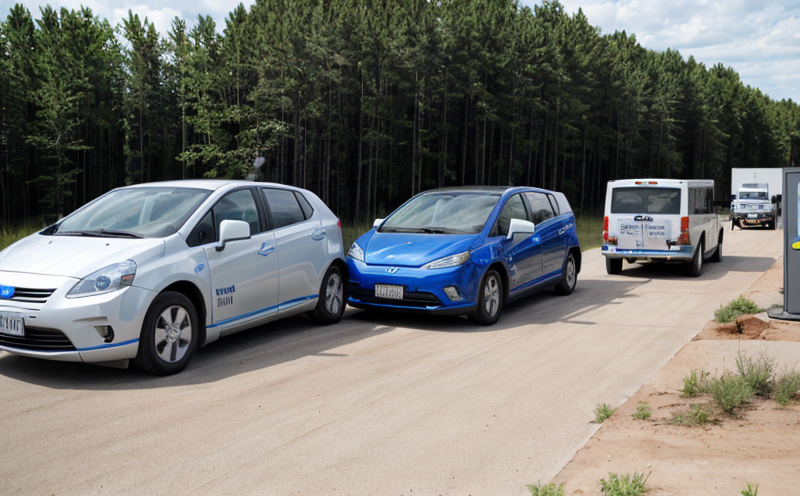ASTM D7990 Fuel Cell Thermal Performance Testing
The ASTM D7990 standard is designed to provide a method for assessing the thermal performance of fuel cells. This testing plays a crucial role in ensuring that fuel cell systems operate efficiently and safely under various environmental conditions, which is essential as renewable energy sources become more integrated into global power generation.
Fuel cells are electrochemical devices that convert chemical energy directly into electrical energy without combustion. They have the potential to reduce greenhouse gas emissions by offering a cleaner alternative to traditional fossil fuel-based systems. However, for these benefits to be realized, it is critical to ensure that fuel cell components and systems perform reliably under diverse operating conditions.
The ASTM D7990 method involves subjecting fuel cells to controlled thermal environments while monitoring various performance parameters such as voltage, current density, power output, and efficiency. This testing helps manufacturers identify potential weaknesses in their designs before the products reach commercialization stages. By adhering to this standard, companies can enhance product reliability, safety, and durability.
Thermal stability is one of the key factors influencing fuel cell performance over time. Poor thermal management can lead to premature degradation or failure of critical components within the system. Therefore, understanding how different temperatures affect fuel cells during operation becomes paramount for optimizing design choices and operational strategies.
The ASTM D7990 protocol specifies procedures that simulate real-world operating conditions, including changes in ambient temperature, humidity levels, and pressure variations. These simulations help predict long-term performance trends more accurately than static measurements taken under laboratory settings alone. As a result, fuel cell manufacturers can make informed decisions about material selection, component integration, and overall system architecture.
Additionally, this test ensures compliance with relevant international standards like ISO/IEC 15296-3:2018 which governs the performance of stationary fuel cells used for electricity generation. Compliance with such standards enhances market access opportunities by meeting regulatory requirements across various jurisdictions worldwide.
In summary, ASTM D7990 thermal performance testing is vital for ensuring reliable and efficient operation of fuel cells throughout their lifecycle. It supports continuous improvement efforts aimed at enhancing both short-term and long-term reliability metrics while promoting sustainable development goals within the energy sector.
Eurolab Advantages
Eurolab offers unparalleled expertise in fuel cell thermal performance testing, leveraging state-of-the-art facilities and experienced personnel to deliver accurate results consistently. Our team of professionals understands the nuances involved in this specialized field, ensuring that each test adheres strictly to ASTM D7990 guidelines.
- Our laboratories are equipped with advanced climate chambers capable of simulating wide ranges of temperature and humidity conditions.
- We employ sophisticated data acquisition systems to capture detailed measurements of fuel cell performance parameters throughout the testing process.
- A dedicated team of engineers provides ongoing support, from initial consultation through final report generation.
By choosing Eurolab for your ASTM D7990 testing needs, you gain access to comprehensive services tailored specifically towards optimizing fuel cell performance and ensuring compliance with relevant international standards. Our commitment to excellence ensures that every result meets or exceeds industry expectations.
Why Choose This Test
Selecting ASTM D7990 thermal performance testing for your fuel cells offers numerous advantages:
- Ensures Reliability: By identifying potential issues early in the development process, you can address them before production begins, leading to more robust and dependable products.
- Promotes Safety: Proper thermal management is crucial for preventing overheating or other hazards that could compromise safety during operation.
- Sustains Efficiency: Maintaining optimal temperatures helps preserve fuel cell efficiency, thereby extending operational lifespan and reducing maintenance costs.
In addition to these benefits, adhering to ASTM D7990 also enhances your product's reputation among customers who prioritize sustainability and reliability. This can translate into increased market share and customer loyalty.
Competitive Advantage and Market Impact
- Innovation Leadership: Demonstrating leadership in adopting stringent testing protocols positions your company at the forefront of technological advancement within the fuel cell industry.
- Regulatory Compliance: Meeting or exceeding ASTM D7990 requirements ensures that your products comply with international standards, facilitating smoother entry into global markets.
- Customer Confidence: Providing transparent and rigorous testing results instills trust among potential buyers, fostering long-term relationships based on reliability and quality assurance.
The ability to consistently pass ASTM D7990 tests differentiates your company from competitors who may not prioritize these stringent standards. This competitive edge translates into higher customer satisfaction rates and broader market reach.





